Celebrating NGG Graduates
Please join us in our celebration as we highlight our NGG graduates.
The profiles are sectioned by degree type:
Doctor of Philosophy
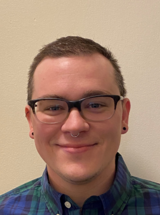
Lyles Clark
Mentor: Amelia Eisch, PhD
Thesis Title: Modeling Genetic, Neural and Behavioral Correlates of Substance Use Disorders in Mice
Research and Lab Description: The Eisch lab is interested in interrogating hippocampal circuitry to understand the role the hippocampus (and dentate gyrus in particular) plays in cognition and affective behavior. Lyles' thesis work examined the temporal dynamics of changes in neurogenesis and microglial activation in the hippocampal dentate gyrus following mild traumatic brain injury.
Post PhD Plans: Lyles is currently working as a Data Project Manager with Dr. Corey McMillan, specializing in regulatory and transfer processes involved in sharing large clinical datasets related to frontotemporal degeneration and related dementias.
Mentor Comment: Lyles's progress during graduate school was due in great part to a range of their positive personal characteristics: diligence, curiosity, maturity, ability to both lead and be a team player, whip-smarted-ness, and a down-to-earth nature. Lyles’ clarity of communication, patience, and social acumen were particularly instrumental in their success in mentoring others in the lab. Good scientists are hard to come by, but good scientists who are also good mentors and good lab citizens – like Lyles – are really treasures. I am very jealous that the McMillan Lab gets to work with Dr. Clark now every day, but I feel very fortunate that Lyles was my first PhD graduate since my arrival at PennMed/CHOP.

Mariexcel (Felicia) Davatolhagh
Mentors: Marc Fuccillo, MD, PhD
Thesis Title: Molecular Control of Synaptic Efficacy Within Striatal Circuits
Research and Lab Description: The Fuccillo lab is interested in understanding how neural circuits generate and regulate mouse behavior - from simple motor patterns to complex goal-directed actions. During graduate school, I examined the physiological role of Neurexin1alpha, a synaptic cell adhesion molecule, within striatal circuits.
Post PhD Plans: Postdoc at UCLA in Churchland Lab
Mentor Comment: Felicia Davatolhagh was my first graduate student and the backbone of my new lab for years. In her time, Felicia became an expert in acute slice electrophysiology, as evidenced by her massive sole author paper in Cell Reports, where she used multiple novel techniques to understand how corticostriatal circuits were altered by mutations in Neurexin1a. Felicia also used her expertise in a highly collaborative manner, making essential and substantial contributions to stories published in eLife, Neuron, Current Biology and other journals. She was a delight to have around and I’m excited to see the next big thing she will do in neuroscience.
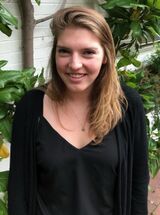
Michelle Klima
Mentor: Nick Betley, PhD
Thesis Title: Central Control of Pain and Inflammation Through a Hunger Circuit
Research and Lab Description: The Betley lab investigates how hunger circuits in the brain influence food intake, behavior, and physiological functions using behavioral and imaging experiments. My thesis work uncovered that activation of a hunger brain circuit can reduce pain and inflammation after an injury highlighting a novel pathway to influence pain/inflammation.
Post PhD Plans: Consultant at Boston Consulting Group
Mentor Comment: Michelle was a fantastic first graduate student. Her thesis was a study in perseverance and her determination, skill, and ability to stay positive in the face of a difficult project speaks volumes to her ability as a scientist and as an individual. It was an honor to have her in the laboratory and we all look forward to the great, world-changing things she will do in the future.
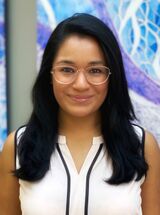
Rosa Leon
Mentor: Matthew Hayes, PhD
Thesis Title: Serotonergic Modulation of the Central GLP-1 System
Research and Lab Description: The Hayes lab focuses on characterizing novel neural signaling pathways controlling for food intake. My thesis focused on investigating the interaction between two satiation neuropeptides (5-HT and GLP-1) in the brain. Findings from my dissertation determined the directionality of the interaction, identified two molecular receptors involved, and assessed the of role the interaction in regulating feeding behavior and stress-induced neuronal activity in the hindbrain.
Post PhD Plans: Interned for a VC firm (3 months), Backpacked/lived abroad (9 months) and Currently working as a digital project manager (2.5 months)

Ina Mexhitaj
Mentor: Amit Bar-Or, MD, FRCPC
Thesis Title: T Cell Responses in Pediatric-Onset Multiple Sclerosis: A Unique Window into Early Disease
Research and Lab Description: The Bar-Or lab studies immune interactions and regulation in the context of injury and repair of the human CNS. The lab’s particular interest is to develop clinically useful biomarkers and advance precision medicine in autoimmune and CNS inflammatory diseases across the age span. My thesis work largely focused on investigating T cell profiles and responses in unique pediatric patient cohorts, as well as provide insights into potential interactions with other immune cell types and their targets involved early in the pathogenesis of multiple sclerosis.
Post PhD Plans: I am currently working as a Medical Science Liaison in Neurology, at the global healthcare company Sanofi, where I am responsible for forming and maintaining partnerships with health care professionals and key opinion leaders to advance patient needs.
Mentor Comment: Ina has been a wonderful member of our lab - hardworking, considerate and an absolute delight to work and interact with. She managed a challenging transition from Montreal to Philly as the lab moved mid-way through her PhD with grace and elegance. Her scientific contributions have had a major impact not only to our lab’s efforts but also more generally to the fields of pediatric-demyelinating disease and neuroimmunology. We will miss her though delighted she is continuing in the field of biomedicine and look forward to future interactions!

Leah Middleton
Mentor: Ismail Abdus-Saboor, PhD
Thesis Title: Identification of sensory neurons encoding pleasurable social touch
Research and Lab Description: The Abdus-Saboor lab is a supportive community of talented scientists that apply genetic tools to study the cells and circuits underlying pain, touch, and itch behaviors. Through my thesis research, I identified that a population of sensory neurons innervating the mouse skin are specialized to detect social and sexual pleasant touch.
Post PhD Plans: Postdoctoral work with Dr. Seth Blackshaw at Johns Hopkins University.
Mentor Comment: Leah is a hard-working, talented, dedicated, and meticulous scientist who spearheaded an entire new direction for my lab. She took on a challenging project and built new experimental paradigms from scratch, with assistance from lab members and colleagues. Her study identifying a skin-brain pathway for rewarding touch has been heavily downloaded at bioRxiv and we are completing revisions now at Cell, after favorable reviewer comments. Leah’s next step is a postdoc at Johns Hopkins University with Seth Blackshaw and we are all so proud of her and expect nothing but continued greatness.
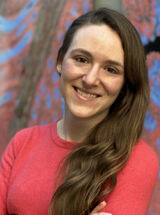
Patricia "Patti" Murphy
Mentor: Michael Granato, PhD
Thesis Title: Choosing the Right Path: Analysis of Axion Guidance in Peripheral Nerve Regeneration
Research and Lab Description: In addition to nerve regeneration, the Granato lab studies the cellular and molecular mechanisms underlying learning and behavior in zebrafish. My thesis work focused on how after nerve injury, motor nerves in zebrafish regrow to their original muscle targets. In humans, promoting nerve regrowth toward appropriate targets is one of the major barriers to functional nerve regeneration, along with increasing the rate and distance of nerve regrowth.
Post PhD Plans: After defending in July 2021, I completed a Science Corps fellowship in Morocco where I created a Research Methods course for middle schoolers. In April of 2022, I began postdoctoral work in the lab of Dr. Kara McKinley in the Harvard Department of Stem Cell and Regenerative Biology. In the McKinley Lab, I'm investigating functional roles for the remarkable degree of nerve remodeling that occurs in the menstruating, pregnant and postpartum uterus.
Mentor Comment: Patti’s thesis research provided fundamental molecular and cellular insights into how regenerating peripheral nerves reconnect in vivo with their pre-injury targets. Patti is a truly outstanding scientist, and she is also a generous and kind person who helped promote a positive and inclusive culture within my laboratory. Patti is very committed to promoting outreach, diversity and inclusion in science, she is a founding member of the Neuroscience Public Lecture, a founding member of the Neuro Coloring Network and was an executive board member of GLIA. I am so proud of Patti and her achievements, and I look forward to her continued success!
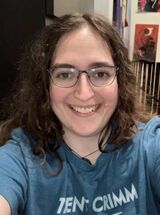
Kyra Schapiro
Mentor: Josh Gold, PhD
Thesis Title: The Role of Working Memory in Implementing Computational Elements of Visuo-Spatial Decision-Making
Research and Lab Description: The Gold lab generally explores models of adaptive decision making, particularly in contexts of uncertainty and change. My thesis research explored the effects of working memory limitations on decisions requiring the integration of evidence held in working memory.
Post PhD Plans: I plan to improve my woodworking skills and spend time with my family and cats. Eventually I plan to pursue a post doc in small model organism neural circuits with the goal of gaining the skills to investigate the hypothesis that sea shell patterning is under neural control.
Mentor Comment: Kyra did a wonderful job of conceptualizing and executing her dissertation project, at every stage demonstrating the kind of “intellectual ownership” that is central to obtaining a PhD. This work, which involved careful behavioral measurements analyzed using sophisticated mathematical models, provides new insights into relationships between working memory and deliberative decision-making that have long been speculated to exist but until now were not demonstrated empirically.
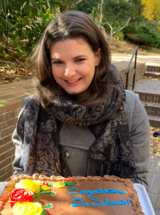
Mary Schreck
Mentor: Minghong Ma, PhD
Thesis Title: State-Dependent Olfactory Processing in Freely Behaving Mice
Research and Lab Description: The Ma lab studies how the brain perceives and responds to sensory stimuli using the mouse olfactory system and has been a wonderfully supportive environment throughout grad school. My thesis research examined how the rodent brain responds to an olfactory stimulus of the same strength during natural sleep and wake by using optogenetics and in vivo electrophysiology to simultaneously record from hierarchical brain regions along the olfactory pathway.
Post PhD Plans: I recently started a postdoctoral fellowship at the National Institutes of Health in Dr. Mark Stopfer’s lab studying insect gustatory and olfactory coding.
Mentor Comment: Mary is an exceptionally talented scientist. She investigated how the brain processes olfactory information in different states (i.e., wakefulness versus sleep) by combining optogenetics and electrophysiology in freely behaving mice. She obtained an NRSA F31 fellowship for her thesis project and received the Don Tucker Memorial award for outstanding graduate student presentation in the 2020 International Symposium on Olfaction and Taste (ISOT) meeting. Mary carried out her thesis work quite independently and contributed to multiple collaborative projects, leading to four publications so far. We miss her in the lab and wish her the very best in her postdoctoral training at NIH!
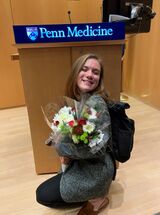
Brenna Shortal
Mentor: Alex Proekt, MD, PhD
Thesis Title: State Transitions Within the Cortex are Strongly Influenced by Local Interactions Under General Anesthesia
Research and Lab Description: Alex Proekt is an Associate Professor in the Department of Anesthesiology and Critical Care whose lab uses multiple techniques and models to study how the brain returns to consciousness after exposure to general anesthetics. My thesis work demonstrates that oscillatory neuronal activity within the cortex is strongly influenced by local interactions and that these local interactions have the potential to be a stronger organizing mechanism for cortical activity than previously appreciated which has important implications for anesthetic monitoring, clinical sleep disorders, and our basic understanding of thalamocortical activity patterns.
Post PhD Plans: I began working as an Associate Director of Scientific Services with PPM Advisory Group in April 2022.
Mentor Comment: I was lucky to recruit Brenna into my lab. Brenna’s research project built upon an observation that en route to recovery from anesthesia, the activity in the thalamocortical system undergoes abrupt and spontaneous transitions between global activity patterns akin to sleep stage transitions. While these abrupt transitions are fundamental to the brain’s ability to recover consciousness, the mechanisms that give rise to them were unknown. Surprisingly, Brenna discovered that these abrupt state transitions do not occur simultaneously across different cortical regions, or even across different cortical layers within the same cortical region. Interestingly, just the weak correlations between state transitions at different cortical sites were sufficient to give rise to apparently coordinated state transitions throughout the cortex. Brenna was awarded an F31 grant through the NINDS and her work was published in the British Journal of Anesthesia with another publication currently in revision at the Journal of Neuroscience.
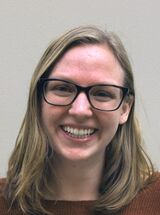
Sara Taylor
Mentor: Edward (Ted) Brodkin, MD
Thesis Title: Investigating Quantitative Autism Spectrum Behaviors in a Family-Based Genetics Study
Research and Lab Description: My thesis work focused on a broad range of behaviors related to the autism spectrum, exploring how patterns of behaviors exist across families as well as evaluating best measurement practices for autistic adults and their families. This work was in the Brodkin Lab, which investigates neurobiological and genetic underpinnings of social behavior, as well as part of a broader collaboration of scientists forming the Autism Spectrum Program of Excellence.
Post PhD Plans: Postdoctoral researcher in the Jenkins lab at UPenn exploring social cognitive neuroscience.
Mentor Comment: Sara’s outstanding dissertation focuses on the use of quantitative autism-related phenotypes in genetic studies. Her thesis addresses key, foundational issues in the field, including the reliability of quantitative phenotyping measures in autism, and the heritability of these phenotypes across several autism-related behavioral domains, including social communication, repetitive behaviors, and executive functioning. Sara also examined the relationships among autism spectrum traits, psychological resilience, anxiety, and depression during the COVID-19 pandemic. Sara is one of the brightest, most productive students who I have had the privilege to mentor, and she, in turn, provided wonderful mentorship to younger students and undergraduates in the lab. Sara has a strong interest in equity and inclusion for neurodiverse populations, science policy, and in making research responsive to needs of people on the autism spectrum. Sara also has a strong interest in sharing the excitement of neuroscience research with broader audiences, and she is now hosting her own terrific podcast to do this, The Brain Break Room.
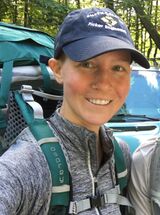
Ursula Tooley
Mentors: Allyson Mackey, PhD; Danielle Bassett, PhD
Thesis Title: Functional brain network development: Shifting boundaries & environmental influences
Research and Lab Description: Ursula was co-mentored by Dr. Allyson Mackey and Dr. Dani Bassett; the Mackey Lab studies brain plasticity and development in early and middle childhood, and the Bassett lab takes a multidisciplinary approach to studying complex systems. Her thesis research took a network science approach to studying large-scale intrinsic brain networks during childhood and adolescence, and examined environmental influences on brain network development.
Post PhD Plans: She will be doing a postdoctoral fellowship at Washington University in St. Louis, under the direction of Dr. Deanna Barch, Dr. Cynthia Rogers, and Dr. Chris Smyser.
Mentor Comment: Ursula A. Tooley graduated from Penn with first-authored papers in Nature Reviews Neuroscience, Cerebral Cortex, and NeuroImage. She was a co-author on several studies in journals including Proceedings of the National Academy of Sciences, Nature Methods, and Developmental Cognitive Neuroscience, with many more on the way. Her research focused on the structure and stability of children’s brain architecture, and explored environmental influences on functional brain development. Ursula’s research earned her the Graduate Research Fellowship from the National Science Foundation, and invitations for several international talks and training programs. Beyond research, she was a Senior Fellow for the Center for Neuroscience and Society, mentored 7 undergraduate independent projects, and led neuroscience outreach projects.
Combined Degree, MD-PhD

Adeeti Agarwal
Mentors: Max Kelz, MD, PhD; Alex Proekt, MD, PhD
Thesis Title: The Characterization of Visual Evoked Feedforward-Feedback Travelling Waves in Mice During Waking and Anesthetized States
Research and Lab Description: The Kelz and Proekt labs study the mechanisms that underly anesthetic induced unconsciousness. During my PHD, I studied how long range traveling waves integrate visual evoked activity across many brain area in awake mice, and aspects of how waves are disrupted when mice anesthetized.
Post PhD Plans: Finishing up medical school
Mentor Comment: We were incredibly fortunate to recruit Adeeti into our labs. From the beginning, Adeeti proved she was ready for a career in science. She initiated an entirely novel project that lacked preliminary data. Taking the idea truly from the ether, Adeeti asked the question of how general anesthetics might impair perception. She was awarded an F30 grant from the National Eye Institute. Adeeti delivered simple visual stimuli to mice cycling between states of anesthesia and wakefulness, and recorded evoked potentials across a hemisphere. She discovered that simple visual stimuli initiate intertwined feedforward and feedback traveling waves, which coordinate neuronal activity across broadly distributed neuronal networks. In the anesthetized state, feedforward signaling continues unabated, but a common disruption of feedback signaling by molecularly distinct anesthetics may be a central mechanism by which hypnotic doses of anesthetics impair perception. Adeeti’s work is published in Nature Communications, Frontiers in Systems Neuroscience, and PLoS One. Following her PhD defense, Adeeti has returned to Penn Med to complete her MD degree.
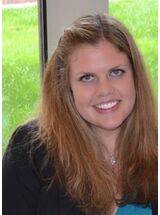
Katherine (Kate) Beattie
Mentor: Wenqin Luo, MD, PhD
Thesis Title: TRPC3 Antagonizes Contact Dermatitis-Induced Pruritus
Research and Lab Description: The Luo lab studies the molecular mechanisms and neuronal circuits governing the sensations of touch, pain, and itch behaviors. My thesis work identified that the cationic channel TRPC3 antagonizes itch sensation induced by contact dermatitis and proposed a new pathway of neuronal inhibition of itch sensation.
Post PhD Plans: Since defending my Ph.D., I have returned to medical school to complete my clinical training through the MD/PhD program at the Perelman School of Medicine at UPenn. This summer, I will apply to anesthesia residency programs to continue my clinical training. I plan to continue to train in both medicine and neuroscience with the goal of pursuing a career as a physician scientist.
Mentor Comment: Kate demonstrated impressive persistency and resilience in her PhD research. During this tough journey, Kate tried her best to learn and to adapt. Through persistent and hard work, Kate made novel interesting discoveries for her PhD thesis project and won the research paper prize for the combined degree students. Congratulations, Kate!

China Byrns
Mentor: Nancy Bonini, PhD
Thesis Title: Glia Contributions to Traumatic Brain Injury
Research and Lab Description: The Bonini lab studies the mechanisms of neurodegenerative disease and aging using Drosophila. My dissertation modeled traumatic brain injury in fruit flies and revealed a novel glial injury response that accelerates brain aging and degenerative disease.
Post PhD Plans: I am currently completing a post-doctoral year in the Bonini lab and taking as many ballet classes as possible, with plans to complete medical school by Spring 2024 and pursue a residency in neuropathology.
Mentor Comment: China is a passionate, enthusiastic and gifted scientist. Outstanding technically at the bench, she also mastered bioinformatic analyses of nextgen approaches, placing her in an exceptional position to continue integrating these important disciplines for novel insight going forward. She has a vibrant mind, and is constantly generating and evaluating hypotheses to explain her data, which she then rigorously tests. She was fantastic fun to work with, and I very much look forward to following her career!
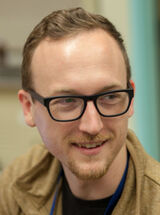
Kevin Goff
Mentor: Ethan Goldberg, PhD
Thesis Title: VIP Interneuron Cell and Circuit Dysfunction Underlying Dravet Syndrome
Research and Lab Description: The Goldberg lab studies genetic neurodevelopmental disorders focusing on epilepsy and with an interest in how ion channel mutations give rise to circuit-level deficits driving severe neurological diseases. I studied the role of VIP-expressing interneurons in the development of severe autism and intellectual disability using a mouse model of Dravet Syndrome.
Post PhD Plans: I am currently finishing medical school and will be going to residency next year. I plan on continuing basic science research through residency and beyond as I shape my career in academic medicine.
Mentor Comment: Kevin graduated from Haverford College in Haverford, PA, with a degree in chemistry, and a liberal arts education in classical music, Latin, and American history, and was a four-year Varsity letter winner in baseball. He was awarded a Fulbright scholarship and spent a year in Norway studying microRNA regulation of synaptic transmission, then worked at the Max Planck Florida Institute studying the ultrastructure of the calyx of Held for two years prior to matriculating at Penn. Kevin was an absolutely spectacular graduate student. His work focused on mechanisms of circuit pathology in a prominent neurodevelopmental disorder known as Dravet syndrome. Kevin identified dysfunction of a subset of GABAergic inhibitory interneurons in cerebral cortex known as VIP (vasoactive intestinal peptide-expressing) interneurons in Dravet syndrome and a role for VIP interneuron dysfunction in abnormal brain state transition and the basis of intellectual disability and features of autism spectrum disorder characteristic of this syndrome. Kevin published two first-author papers in eLife (Goff and Goldberg, 2019) and Developmental Neuroscience (Goff and Goldberg, 2021) with a third in preparation at the time of his graduation, and was co-author on four additional papers in Journal of Neuroscience, Cell Calcium, eLife, and Cell Reports. He earned an NIH NRSA F31 Award and the William F. Jeffers Prize for Research in Neurology. He was a mentor to a Penn undergraduate who ultimately went on to pursue MD/PhD training. Kevin learned quickly and became involved in almost everything in the lab based on an unusual combination of intelligence, knowledge, hard work, ability to quickly learn new things, computational skills, and practical hands-on proficiency in the lab. Mentoring Kevin has been an absolute pleasure and I look forward to following what I know will be a successful and impactful career in academic medicine. I wish him the best and will always be there for him when he needs me.
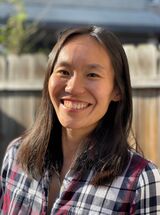
Natalie Gong
Mentor: Matt Kayser, MD, PhD
Thesis Title: Molecular Factors Governing Sleep Circuit Maturation and Neurodevelopmental Disorders
Research and Lab Description: Natalie worked in Matthew Kayser’s lab, which focuses on the early life development of behaviors including sleep. Natalie’s research on the mechanisms underlying sleep problems in neurodevelopmental disorders showed sleep deficits are a core phenotype in these disorders arising from disruptions in sleep circuit development.
Post PhD Plans: Natalie will apply for psychiatry residencies after completing medical school.
Mentor Comment: It would be impossible for me to overstate Natalie’s unique qualities as a person and scientist. Her impact on the lab extends far beyond her remarkable publication record; she has helped positively shape numerous projects with her conceptual insights, technical skills, and leadership. I feel certain Natalie is poised for a noteworthy future as a physician scientist.

Aimee Juan
Mentor: Marisa S. Bartolomei, PhD
Thesis Title: Differential DNA Methylation Drives Allelic Architecture for Grb10-Ddc Locus in the Developing Heart
Research and Lab Description: My lab studies the epigenetic regulation of imprinted genes in mouse development, which includes analyzing the differences in transcription, DNA methylation and higher order chromatin structure between each parental allele, as well as how environmental exposures including assisted reproductive technologies affect imprinted gene status. My thesis research is about an imprinted gene cluster (Grb10-Ddc) that is required for normal mammalian skeletal muscle growth and heart development, and uncovers unique chromatin regulators and 3D gene architecture that control expression of these genes from either the maternal or paternal chromosome.
Post PhD Plans: After I completed the PhD, I returned to medical school to finish my MD/PhD program and plan to continue research in complex gene regulation during my residency in pediatric medical genetics.
Mentor Comment: It is hard to imagine a person more dedicated to finding the answer to a biological question than Aimee. Neuroscientist turned epigeneticist, Aimee elucidated the regulation of a complex and developmentally important imprinted locus. Aimee never gave up until the experiment was perfect and the answer unambiguous, even if it meant learning and implementing a whole new type of assay. Her curiosity, passion and enthusiasm are unlimited, her writing beautiful and experiments exquisite. We will miss you Aimee and hope that you maintain your love for basic science as you continue your physician scientist training.

Jacob Sterling
Mentors: Joshua Dunaief, MD, PhD; Qi Cui, MD, PhD
Saul Winegrad Award for Outstanding Dissertation
Thesis Title: Innate Immunity in Degenerative Diseases of the Retina and Brain
Research and Lab Description: My PhD research focused on the role of the immune system in degenerative diseases in the eye and brain. I completed this work under the guidance of my two PhD advisors, Dr. Joshua Dunaief and Dr. Qi Cui, and alongside countless supportive colleagues and thesis committee members.
Post PhD Plans: I am currently finishing the MD half of my MD-PhD, with plans to pursue residency in internal medicine, and ultimately a career as a physician scientist.
Mentor Comment: Josh: It’s been a great pleasure to serve as Jacob’s research mentor during both his undergraduate and MD/PhD years. He’s been extremely productive, making impactful discoveries for both my lab and his co-mentor, Qi Cui’s lab on the pathogenesis and treatment of eye diseases. He develops a constant stream of creative new research ideas and technical innovations. He’s been a superb mentor to the junior lab members and enthusiastic collaborator with his peers and faculty. As a lab citizen, he’s been a tremendous help—including developing of our fun lab website at dunaieflab.org. .
Qi: Jacob was an absolute joy to have in lab. Innovative, hardworking, and a consummate team-player, Jacob not only contributed to the growth of our labs but shaped their directions during his time with us. I have no doubt he will be a success in any scientific field he chooses to focus his considerable creative energy.

Aaron Williams
Mentor: Maria Geffen, PhD
Thesis Title: Neuronal Codes and Circuits Underlying Audiovisual Integration
Research and Lab Description: The Geffen lab uses computational, anatomic, and functional approaches to investigate the neuronal circuits that support auditory perception and learning. My thesis researched the neural underpinnings of audiovisual integration, using a mouse model to reveal the coding schemes through which sound improves visual processing in individual and groups of neurons.
Post PhD Plans: I will return to medical school and then will apply to Neurology residency.
Mentor Comment: Aaron discovered a novel aspect of interactions for audio-visual integration. His research has important implications for our understanding of communication and development of sensory processing. He is an incredibly intelligent, curious and hard-working scientist. He fearlessly chose to study not one, but two sensory modalities. His thesis took him through the whole brain, starting in the auditory midbrain and ending up in the visual cortex. He will be an impactful physician-scientist and I wish him best of luck in finishing up medical school.

